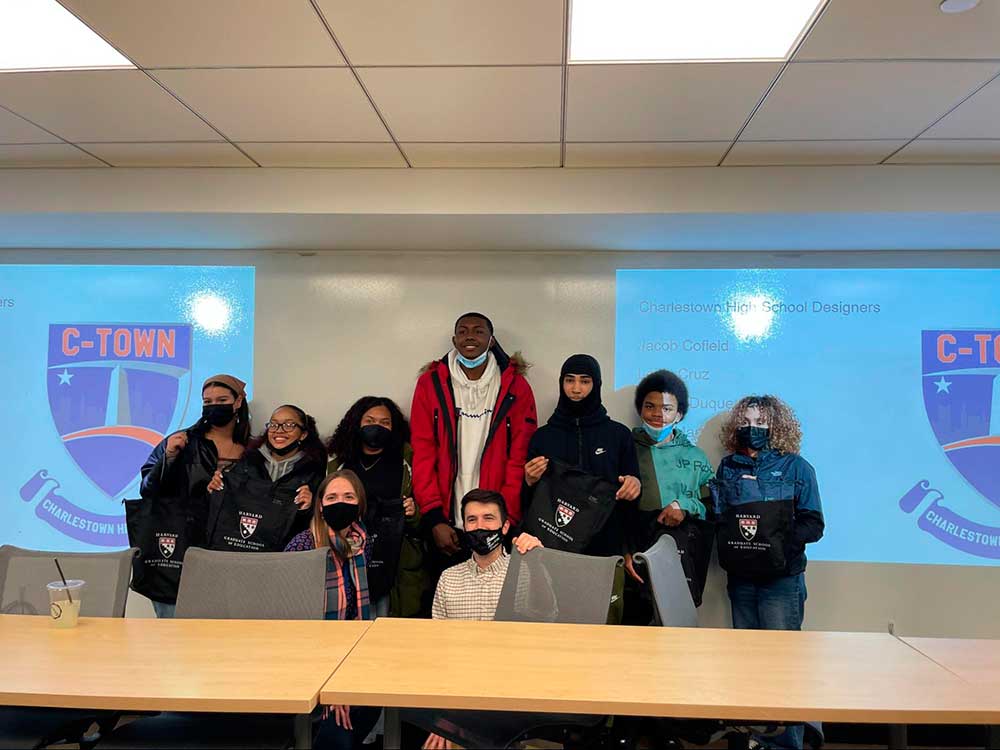By Linda Nathan, Co-Director Perrone Sizer Institute for Creative Leadership and Adjunct Lecturer HGSE
The Students are Watching. That’s what author and educator Ted Sizer wrote. They are observing the adults, listening and critiquing their every word. Is this thing called school an endeavor worth pursuing? Can I trust those leading? Can I trust what I’m learning?
Recently, a group of 10th grade students from Charlestown HS in Boston came to my HGSE class, “Building Democratic Schools.” My graduate students were listening carefully. What had they, perhaps, missed in their own design process?
“We have a lot of ideas to make our school better. We have been designing for a while.” Each of our high school visitors shared some of their top innovations. Longer and healthier lunches topped many lists. “I’m a vegetarian,” said one young woman “and most of the time there is literally nothing healthy to eat.”
Others had intricate ideas about the schedule: adding more elective classes. “School can’t just be about double English and double Math” (referring to the trend of adding more minutes in those classes in order to get students to pass standardized tests). “We want to learn different things, too. If we have to do all that English, make one of the classes journalism, creative writing or theater. That way we graduate with different options and connections.” Or, have one day a week that is shorter. “That could break up the week.”
They had ideas for ways to offer an open campus that would allow 11th and 12th graders to leave the building and enjoy lunch. “And there should be a wide variety of internships. That’s the way we learn what we like and what we are good at.”
Discussions also included ways to think about rules. “What good does suspension do? Students just miss more school. We need to be more creative about how to engage students in school so they don’t want to miss. But punishing kids for being late is just stupid. No one is late on purpose. Some of us travel really far to get here and school starts really early.”
They advocated for advisories that matter: where someone really knows you; they wanted more sports for everyone; they wanted college students to come tutor so that they could feel more prepared for college; they wanted the school day to build in some breaks so that they could breathe for a minute. They wanted a “cultured school” which meant, I think, a school filled with diverse students and teachers who respected the few sensible rules and were interested in learning. “Freedom to pick classes,” ranked high on their list. So did having key cards that allowed them easier access to the building and also could be programmed for different purposes like open campus or perhaps even badging.
One student advocated for a very innovative idea: a module system: “One class only for 30 days so you can really focus.” Colorado College and Cambridge School of Weston, a local independent school, have been successfully offering this system for decades now.
When my students asked about their process for coming up with these ideas, the students explained the political context. In the fall a group of adults, well-meaning perhaps, had decided to apply for a different status for their school– an Innovation School. “It meant all the teachers would have been fired and then have to reapply for their jobs. That seemed crazy. We didn’t want to lose our teachers.”
Another chimed in. “We knew that it was about gentrification. When we pass one of them on the sidewalk walking their little dogs, those people, mostly white, will cross over to the other side. They don’t want to share the neighborhood with us.” The students’ knowledge of the failed Innovation School Plan as well as the changes to Charlestown was detailed. “So during Feb. break we had a design intensive with our teacher, Mr. Moran. That’s how this started.”
I don’t think the process is stopping. The students have watched; they’ve listened. But now they are speaking out. They will demand action. It’s time for adults to listen.

